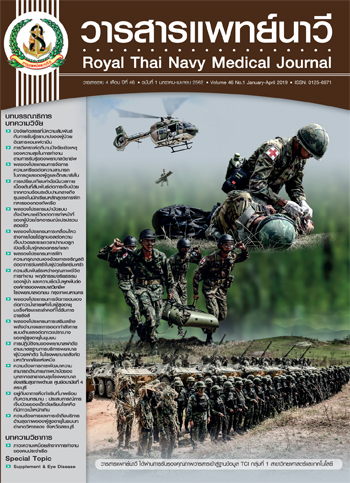The Effect of Life Goals Therapy Program on Functioning in Patients with Bipolar Disorders
Main Article Content
Abstract
This research is a quasi-experimental pretest-posttest control group design. The objectives were to compare: 1) the function of patients with bipolar disorder before and after receiving a life goals therapy program, and 2) the function of patients with bipolar disorder receiving life goals therapy program, and the group that received regular caring activities. The 40 samples were patients with bipolar disorder, who sought for received services in outpatients department, Nakornratchasima Rajanagarindra Psychiatric Hospital were recruited to the sample group. They were matched pair by sex and severity of depression or mania, then randomly assigned to the experimental and control groups, 20 subjects in each group. Research instruments comprised of: 1) life goals therapy program, 2) The Functioning Assessment Short Test, 3) Knowledge on Bipolar Disorder Test, 4) Montgomery Asberg Depression Rating Scale, 5) Thai Mania Rating Scale. The content validity of all instruments had verified by 5 professional experts. The 2nd instruments had Cronbach's alpha reliability of 0.87. Descriptive statistics and t-test were used in data analysis. The conclusions of this research were as follows:
1) The level of functioning of patients with bipolar disorder who received a life goals therapy program was significantly lower than that before (p < .05).
2) Patients with bipolar disorder who received a life goals therapy program was significantly lower than those who received the regular caring activities (p < .05).
Article Details

This work is licensed under a Creative Commons Attribution-NonCommercial-NoDerivatives 4.0 International License.
References
2.Wood SW. The economic burden of bipolar disorder. J Clin Psychiatry 61 (Supp 13);2000:38-41.
3.Ittasakul P. Bipolar disorder. In Lotrakul M, Sukanit P, editors. Psychiatry Ramathibodi. Bangkok: Beyond Enterprise; 2015. p. 155-6. (in Thai).
4.Lotrakul M, Sukanit P. Psychiatry Ramathibodi. Bangkok: Beyond Enterprise. 2015. (in Thai).
5.Paemmongkol P. Psychiatric nursing and mental health. Bangkok: Dharmasarn Industry; 2013. (in Thai).
6.Frye MA, Altshuler LL, McElroy SL, Suppes T, Keck PE, Denicoff K, et al. Gender differences in prevalence, risk, and clinical correlates of alcoholism comorbidity in bipolar disorder. Am J Psychiatry 2003;160(5):883-9.
7.Suratewamit S. Selected factors related to functioning of patients with bipolar disorder. [Master’s Thesis, Faculty of Nursing]. Chulalongkorn University; 2010. (in Thai).
8.Harvey PD. Mood symptoms, cognition, and everyday functioning in major depression, bipolar disorder, and schizophrenia. Innov Clin Neurosci 2011;8(10):14–8.
9.Sanchez-Moreno J, Martinez-Aran A, Tabarés-Seisdedos R, Torrent C, Vieta E, Ayuso-Mateos JL. Functioning and disability in bipolar disorder: An Extensive Review. PsychotherPsychosom 2009;78(5):285-97.
10.Rosa AR, Sánchez-Moreno J, Martínez-Aran A, Salamero M, Torrent C, Reinares M, et al. Validity and reliability of Functioning Assesment Short Test (FAST) in bipolar disorder. Clin Pract Epidemiol Ment Health 2007 Jun 7;3:5.
11.Khomchai B. The effect of group psychoeducation on quality of life in persons with bipolar disorder. [Master’s Thesis, Faculty of Nursing]. Chulalongkorn University; 2011. (in Thai).
12.Laoprasertsook K. The effect of family-focused treatment program on symptom severity of patients with bipolar disorder patient. [Master’s Thesis, Faculty of Nursing]. Chulalongkorn University; 2012. (in Thai).
13.Chatchamni W. Mindfulness for bipolar disorder patients in Nakornatchasima Rajanagarindra Psychiatric Hospital. [Master’s Thesis, Faculty of Nursing]; 2011. (in Thai).
14.Bauer MS, McBride L. Structure group psychotherapy for bipolar disorder: the life goals program. 2nd ed. New York: Springer Publishing Company; 2003.
15.de Andrés RD, Aillon N, Bardiot MC, Bourgeois P, Mertel S, Nerfin F, et al. Impact of the life goals group therapy program for bipolar patients: an open study. J Affect Disord 2006;93(1-3):253-7.
16.Aubry JM, Charmillot A, Aillon N, Bourgeois P, Mertel S, Nerfin F, et al. Long-term impact of the life goals group therapy program for bipolar patients. J Affect Disord 2012;136(3):889-94.
17.Grove SK, Burns N, Gray J. The Practice of Nursing Research: appaisal, synthesis and generation of evidence. 7th ed. St. Lois, MO: Elsevier Saunders; 2013.
18.Montgomery SA, Cassano GB. Management of bipolar disorder. London: Martin Dunitz 1996. p. 13-6.
19.Kongsakon R. Assessment tools for bipolar disorder. In Leelahanaj T, Vasiknanonte S. Text book of bipolar disorder. Bangkok: The Psychiatric Association of Thailand; 2006. p. 343-60. (in Thai).
20.Suksomnirundorn N. Factors related to quality of life of patient with bipolar disorder. [Master’s Thesis, Faculty of Nursing]. Chulalongkorn University; 2009. (in Thai).
21.Hosseini SH, Yousefi KM. Quality of life and global functioning among chronic type I bipolar disorder patients in comparison with a general population in Iran. Asian Journal of Biological Sciences 2009;2(1):29-34.
22.Meeks S. Bipolar disorder in the latter half of life: symptom presentation, global functioning and age of onset. Journal of Affective Disorders 1999;52(1-3):161-7.
23.Lam D, Donaldson C, Brown Y, Malliaris Y. Burden and marital and sexual satisfaction in the partners of bipolar patients. Bipolar Disord 2005;7(5):431-40.
24.Soares JJF, Stintzing, CP, Jackson C, Skolding B. Psychoeducation for patients with bipolar disorder: an exploratory study. Nord J Psychiatry 1997;51(6):439-46.


